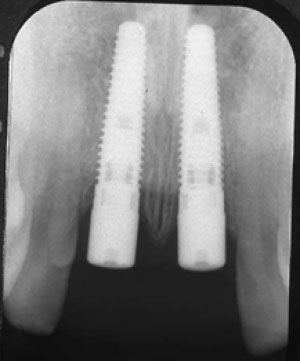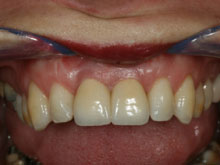Dental Implants
Missing a tooth?
Replacement of lost teeth
Teeth can be lost through trauma. In New Zealand, the subsequent dental treatment costs are often partly funded by the Accident Compensation Corporation (ACC). Cover by ACC does need to be confirmed before we can carry out your dental treatment and work on dental implants.
Many teeth are also lost through tooth decay or fracture, and in this situation dental implants are often the best tooth replacement option. Other options should also be discussed; for some people a bridge or denture (false teeth) is a more suitable alternative.
How do dental implants work?
Dental implant treatment is often more straight forward than most would think. The main advantage over the other methods of tooth replacement, such as denture or bridges, is that dental implants don’t rely on the other teeth for support and they feel like a normal tooth in your mouth.
A dental implant is a tooth root analogue (replica). It is an artificial tooth root made of surgical grade titanium. The implant is placed into the jaw and crowns and bridgework can be constructed onto it.
There are sometimes extra treatments that can be required before a dental implant can be placed. If there is insufficient bone, a small amount of bone will sometimes be borrowed from another part of the jaws to allow for implant placement. To most patients this sounds daunting, but it is a similar to having a tooth extracted. Some swelling for a few days may persist and minor pain killers, like paracetamol, may be supplemented.


Dental implant experts
At Westlake Dental Specialists and Queenstown OMS, we use state-of-the-art technology to help plan dental implant care. Our 2D and 3D x-rays help assess the available bone for implant placement. Where possible, we try and place an implant at the time of tooth extraction (immediate placement). This reduces both dental treatment time and cost. In some cases, front teeth can also have immediate temporary crowns placed by your dentist on the day of surgery. This means that there is no need for a partial denture.
When the implant is ready for a final crown, usually around 3 months after placement, your dentist may recommend that you have an intra-oral scan. The latest in digital impression technology, using our iTero scanner, will allow us to digitally capture your implant to be sent for abutment and crown construction. This can help avoid dental impressions, although sometimes these do need to be taken.
Cost of dental implants
Whilst dental implants are expensive, we strive to keep our implant costs down to make it a realistic alternative in the case of tooth loss. Your dentist or a specialist prosthodontist will need to be involved in the crown stage of the implant; you will need to ask your dentist if an implant is right for you.